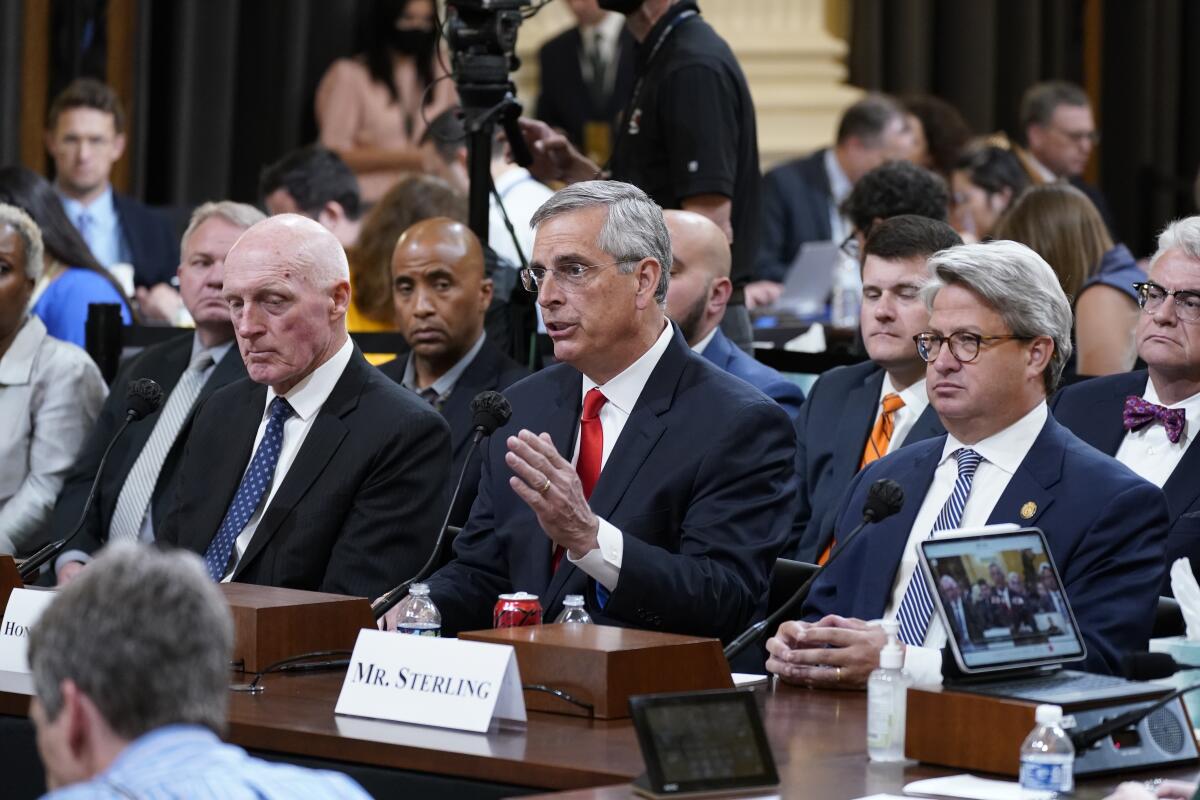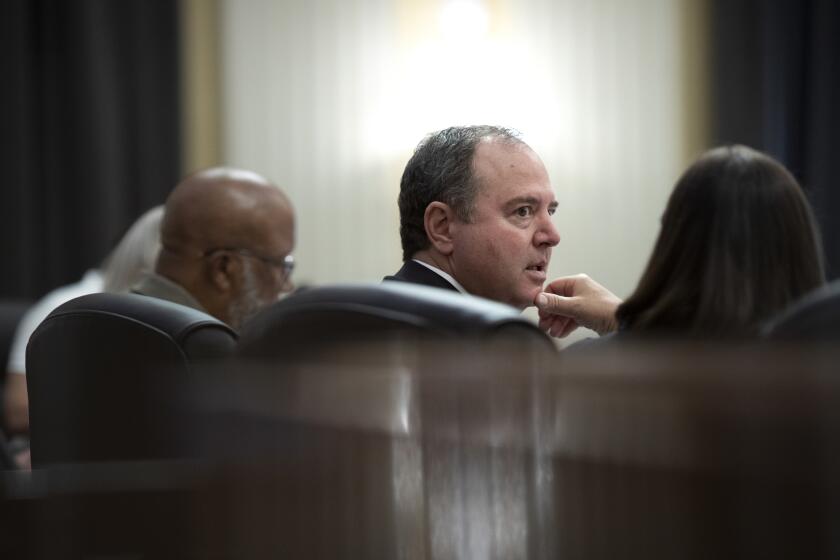‘A tragic parody’: State officials detail frantic pressure campaign to keep Trump in office

WASHINGTON — Republican state legislators and elected officials detailed Tuesday the intense pressure they faced from then-President Trump and his lawyers to subvert the will of voters and submit to Congress false slates of electors backing him.
Arizona state House Speaker Rusty Bowers, Georgia Secretary of State Brad Raffensperger and Georgia Secretary of State Chief Operating Officer Gabriel Sterling, all Republicans, testified at the fourth hearing of the House select committee investigating Jan. 6, 2021, about numerous lengthy phone calls and in-person meetings from Trump and those in his inner circle pushing them to act to keep him in office despite being repeatedly informed the effort was illegal or unconstitutional.
“Pressuring public servants into betraying their oath was a fundamental part of the playbook,” committee Chairman Bennie Thompson (D-Miss.) said. “A handful of election officials in several key states stood between Donald Trump and the upending of American democracy.”
The elected officials detailed in their testimony the retaliation they faced for not complying, as did Wandrea ArShaye “Shaye” Moss, a former Georgia election worker who gave a wrenching account of racist death threats she and her mother faced after being accused by Trump of processing fraudulent ballots.
“It’s turned my life upside down,” Moss told the committee. “I don’t want anyone knowing my name.”
Bowers testified about the calls he received from Trump and conservative California lawyer John Eastman, and about a meeting with Trump attorney Rudolph W. Giuliani in which the former New York City mayor asked him to overturn the state election results after Joe Biden won and instead submit a slate of false electors for Trump.
The legislator said Giuliani pointed out in multiple phone calls that they were both Republicans and said that Bowers had legal authority in Arizona to remove Biden electors and replace them. Giuliani asked Bowers for a committee hearing to do that, and Bowers said he didn’t have such authority.
Giuliani never provided proof supporting his allegations of fraud in the state’s elections, which included claims that hundreds of thousands of immigrants in the country illegally had voted in the election, Bowers said.
“We got lots of theories, we just don’t have the evidence,” Bowers said Giuliani told him.
When Giuliani continued to press him, Bowers told the president’s attorney that he was “asking me to do something that is counter to my oath when I swore it to the Constitution to uphold it, and I also swore to the Constitution and the laws of the state of Arizona.”
“I will not break my oath,” Bowers said, adding that “it is a tenet of my faith that the Constitution is divinely inspired.”
Bowers said he was called the morning of Jan. 6 by Arizona Republican Rep. Andy Biggs, who asked him to support decertification of the state’s electors.
“I said that I would not,” Bowers said.
The committee showed a video detailing how Trump’s plan depended on legislatures in multiple states adopting alternate, fake electors. Trump leaned heavily on state and local officials to take action while his team of lawyers, including Eastman and Giuliani, relied on untested theories about the power legislatures have to override voters. State Republican leaders, Trump campaign lawyers and even the Republican National Committee were asked to persuade people to sign certificates to legitimize the false electors backing the president.
“We were useful idiots, or rubes,” Robert Sinners, a former Trump aide, said of pushing the phony elector scheme in Georgia. He told Jan. 6 investigators he’s now angry he was misled.
“No one really cared if people were potentially putting themselves in jeopardy,” Sinners said.
The committee also played a clip of a deposition from RNC Chair Ronna McDaniel, who indicated that Trump himself called her and connected her to Eastman “to talk about the importance of the RNC helping the campaign gather these contingent electors.”
“The campaign took the lead, and we just were helping them in that role,” she said.
Ultimately, Republicans in Arizona, Georgia, Michigan, New Mexico, Pennsylvania and Wisconsin sent alternate slates to Congress.
The committee also showed a text message from an aide for Wisconsin Republican Sen. Ron Johnson to an aide for Vice President Mike Pence asking whether he could physically hand a copy of the fake elector certificates from Michigan and Wisconsin to the vice president about 20 minutes before he presided over the electoral vote count on Jan. 6, 2021. Johnson’s spokeswoman tweeted during the hearing that the senator wasn’t involved in the creation of the certificates and didn’t know they were going to be brought to his office.
Bowers said that when he learned that a false slate of electors from Arizona had sent fake ballots to Washington, D.C., he thought of the book, “The Gang That Couldn’t Shoot Straight” by Jimmy Breslin.
“This is a tragic parody,” he said.
Raffensperger was on the receiving end of Trump’s Jan. 2 request to help overturn Biden’s win, in which Trump told him to “find 11,780 votes, which is one more than we have, because we won the state.” Rep. Adam B. Schiff (D-Burbank), who led the committee’s questioning Tuesday, said White House Chief of Staff Mark Meadows texted or called Raffensperger’s office 18 times to set up that call with Trump.
“So what are we going to do here? I only need 11,000 votes. Fellas, I need 11,000 votes. Give me a break,” Trump said in a clip from his lengthy call with Raffensperger, which was played at the hearing.
“We didn’t have any votes to find,” Raffensperger told the committee. “The numbers are the numbers and numbers don’t lie.”
Schiff noted that Georgia’s election had been certified, meaning it was too late to change the results, and that Trump had been told repeatedly by his top Justice Department officials that the claims he was making about fraud during that call were false.
Raffensberger stressed that multiple investigations and recounts had already been completed and that no fraud was found.
Jan. 6 panel will detail Mark Meadows’ pressure on state officials after 2020 election. Rep. Adam B. Schiff will play leading role in latest hearing.
Sterling made headlines on Dec. 1, 2020, when he pleaded in a news conference for Trump and his allies to stop spreading lies about the election results.
“Stop inspiring people to commit potential acts of violence,” Sterling said in the news conference. “Someone’s going to get hurt. Someone’s going to get shot. Someone’s going to get killed.”
He testified Tuesday that he lost his temper in the news conference after learning an employee was being threatened online with pictures of a noose.
The Justice Department is also examining the fake electors scheme, as are prosecutors in Georgia.
The House committee highlighted Meadows’ “intimate role” in the pressure campaign. Meadows handed over a trove of emails and text messages to the panel before abruptly refusing to comply further with their subpoenas. The House voted to hold him in contempt of Congress, but the Justice Department has declined to prosecute him.
The committee hearing began with video of a Michigan state senator saying he received 4,000 text messages in just a few minutes after Trump published his cellphone number on Facebook. Pennsylvania House Speaker Bryan Cutler, who received daily phone calls from Giuliani and Trump attorney Jenna Ellis in the last week of November 2020, recalled protests at his home led by Trump’s former chief strategist Stephen K. Bannon. The committee also showed footage of armed protests outside state capitols, which Schiff called “a dangerous precursor to the violence we saw on Jan. 6.”
Bowers told the committee he got 20,000 emails and tens of thousands of voicemails and texts pushing him to overturn the results and noted he still has groups protesting outside his home on Saturdays, calling him a pedophile, pervert and corrupt politician.
Raffensperger said that though he and his wife had their private information published on the internet, and that people broke into his daughter-in-law’s home, he couldn’t back down in the face of the threats.
“I knew that we had followed the law and followed the Constitution,” Raffensperger said. “I think sometimes moments require you to stand up and just take the shots when you’re doing your job, and that’s all we did.”
The second part of the hearing focused on the vitriol directed toward Moss, the former Georgia election worker, and her mother, Ruby Freeman. They were attacked by name by Trump and Giuliani, who falsely claimed that video had captured the women using a USB thumb drive to change votes.
“What was your mom actually handing you in that video?” Schiff asked.
“A ginger mint,” Moss replied.
The Georgia secretary of state’s office conducted an investigation and found no wrongdoing on her part.
Moss said she wanted to work in elections to help people vote and loved being able to assist voters in accessing a right her ancestors didn’t have. Moss said Freeman was instructed by the FBI to leave her home for her own safety for at least two months. Moss also said people attempted to conduct a citizen’s arrest of her and her mother at her grandmother’s home.
“I felt horrible, I felt like it was all my fault,” said Moss, who noted that she and her mother no longer use their names in public and added she rarely leaves the house. “Like, if I wouldn’t have decided to be an elections worker, I could have been anything else. But that’s what I decided to do, and now people are lying and spreading rumors and lies and attacking my mom.”
Schiff said in response: “If the most powerful person in the world can bring the full weight of the presidency down on an ordinary citizen who was merely doing her job with a lie as big and heavy as a mountain, who among us is safe? None of us is.”
Also on Tuesday, British filmmaker Alex Holder complied with a subpoena to turn over to the committee documentary footage he filmed during the final six weeks of Trump’s reelection campaign and video of the Jan. 6 attack on the Capitol. The footage includes exclusive interviews with Trump, his children Ivanka, Eric and Don Jr., and son-in-law Jared Kushner as well as Pence. Holder said in a statement he will sit for a deposition Thursday.
On Thursday, the committee is expected to focus on Trump’s attempts to persuade the Department of Justice to claim fraud occurred in the election and to install a supporter as acting attorney general when those leading the agency refused to comply with his demands.
Rep. Jamie Raskin (D-Md.) said he expects the hearings to continue throughout the summer, rather than ending Thursday as expected, because people are coming forward with new information.
“We are picking up new evidence on a daily basis with enormous velocity, and so we’re constantly incorporating and including the new information that’s coming out,” Raskin said. “Certainly the hearings will conclude before the end of the summer, but I don’t know that we’re going to make it by the end of June.”
The committee will continue making the case that if certain elected officials, public employees and judges hadn’t resisted pressure from Trump to overturn the election results, the future of American democracy might have been at stake, Schiff said.
“The system held, but barely,” Schiff said. “And the question remains, will it hold again?”
Times staff writer Anumita Kaur contributed to this story.
More to Read
Get the L.A. Times Politics newsletter
Deeply reported insights into legislation, politics and policy from Sacramento, Washington and beyond. In your inbox three times per week.
You may occasionally receive promotional content from the Los Angeles Times.












